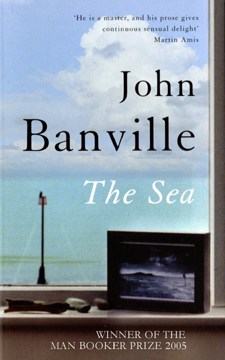Our memories of events can be elusive and interchangeable. Like the experience of waking from a dream, the more we try and lock down a tangible theme, the more the images dissipate and remove any impression. We are left wondering what was real and what is imagined.
In his 14th novel, The Sea, John Banville allows his narrator, Max Morden, to drift through his memories; from a distant childhood holiday, to the recent trauma of his wife's death.
We begin with an introduction to the Grace family, through the eyes of 11 year old Max. Mr and Mrs Grace, their twin children Chloe and Myles, and governess Rose, arrive in the Irish coastal town Ballyless as if from another world. They seem to have it all; love, wealth, freedom, charm and grace. Max is captivated and yearns to belong. He is embarrassed of his humble lodgings, and finds himself hovering at their gate, eager to be accepted and adopted. He becomes infatuated with first Mother Grace then daughter Chloe and willingly suffers their derision, believing in this case that any attention is better than none.

Twins Chloe and Myles Grace are interesting characters, and ultimate protagonists. Chloe is strongwilled, petulant, moody, and generally dissatisfied, whilst Myles remains mute, perhaps as a response to his dominant sister, or to make an impression on his distracted mother. Young Max transforms their duo into a turbulent trio, resulting in a traumatic event which changes him forever.
Now in his sixties, Max returns to Ballyless after the loss of his wife. He is not only escaping from bereavement but from the smell of mortality. Max weaves through episodes from his remote and recent past, and the presence of water becomes a metaphor for the shifting, changing and intangible elements of his mind.
John Banville's prose is mesmerising. He forces the reader to immerse themselves in his work, delicately savouring each word. Scanning a page feels like feasting and leaves you with an unsettled stomach. However, Banville is not known for his storylines; plot, character development and suspense are not high on his priority list. In a recent interview he remarked; "Flaubert wanted to write a book that would be about nothing - and every novelist worth his salt aspires to that."
Banville's descriptions are so unique, there is a curiosity to engage with him, I found myself wondering; "How would he describe me?" One example is his description of the Grace family governess Rosie;
"I suppose someone wishing to be unkind" .would describe her features as sharp. Her nose, with its tear-shaped, pharaonic nostrils, was prominent at the bridge, the skin stretched tight and translucent over the bone. It is deflected, this nose, a fraction to the left, so that when one looks at her straight-on there is the illusion of seeing her at once full-face and in profile, as in one of those fiddly Picasso portraits."
Although the novel does not hold a strong storyline, there are undercurrent themes of death and grief. As a Christian I read The Sea with a deep sense of sadness, and a longing for the characters (and author) to know God. With him we have knowledge. He has revealed his plan for us, and we know that death is not the end. We still suffer, and grieve and mourn, but we have hope and a sense of a better future for our loved ones and ourselves. Something Max Morden clearly lacked.
Winner of the 2005 Man Booker Award, The Sea is a beautifully crafted work, a pleasure to read and fulfilling to reflect upon.






















